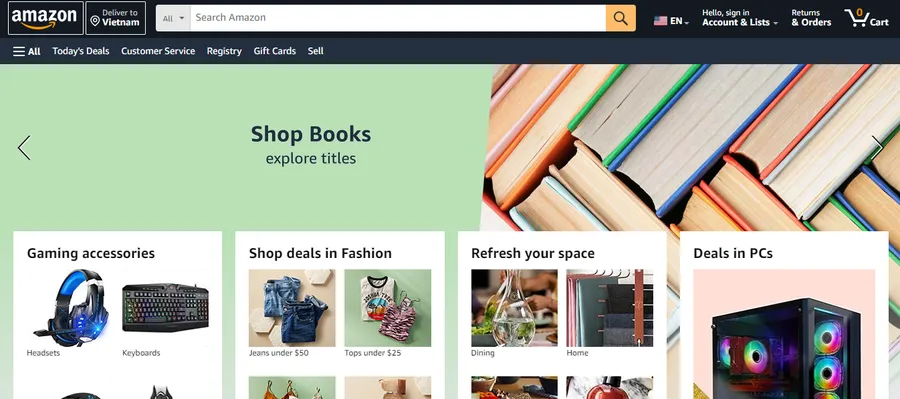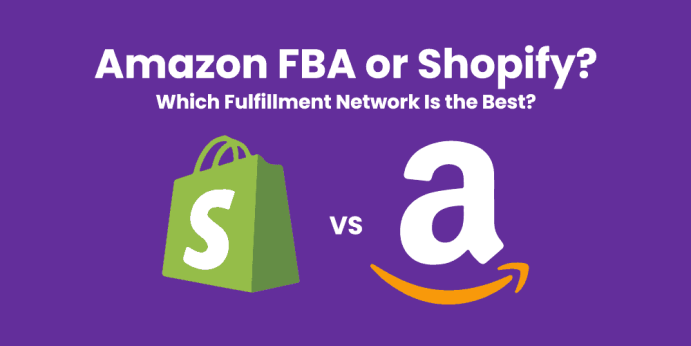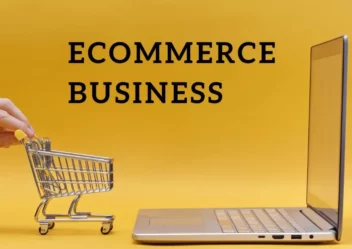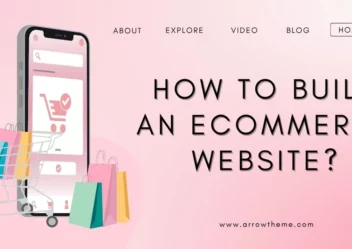Shopify vs. Amazon: Which eCommerce Platform to Choose?
Are you thinking of launching your online store? Great! But the first question you’ll face is: Shopify vs. Amazon? Both are popular choices, and both can help you succeed, but they’re very different.
Shopify is like building your own house – you have complete control, but it takes more work. Amazon is like renting an apartment in a bustling city – it’s easier to get started, but you have less freedom.
So, which is the right fit for your business?
In this blog post, we’ll break down the definition of each platform, comparing everything from costs and features to ease of use and marketing tools. By the end, you’ll have a clear picture of which platform is the best match for your online store dreams.
Let’s dive in!
Lusion – Multipurpose eCommerce Shopify Theme
We provide an amazing Shopify theme with fast and responsive designs. Let’s find out!
Shopify vs. Amazon: At a Glance

Shopify vs. Amazon Comparison Table
Shopify is a platform for building your own branded online store, while Amazon is a massive marketplace where you compete with other sellers. Shopify is better for those wanting to establish a unique brand identity, while Amazon suits those seeking a large, existing customer base. Let’s check the Shopify vs Amazon comparison table:
| Feature | Shopify | Amazon |
| Purpose | E-commerce platform for building and managing your online store | Online marketplace to sell products alongside other sellers |
| Ideal For | Businesses of all sizes seeking to establish a unique brand identity and control their online presence | Businesses seeking to reach a large audience and leverage Amazon’s infrastructure |
| Customization | High degree of customization with templates, themes, and apps | Limited customization options, adhering to Amazon’s standardized templates |
| Pricing | Monthly subscription fees ranging from $5 to $299+, depending on the plan. Additional transaction fees may apply if not using Shopify Payments. | Individual plan: No monthly fee, but $0.99 per item sold + additional selling fees. Professional plan: $39.99/month + additional selling fees. |
| Payment Processing | Integrated Shopify Payments (powered by Stripe) or third-party providers | Amazon Pay or other payment methods supported by Amazon |
| Fulfillment | Self-fulfillment or integration with third-party fulfillment services like Amazon FBA | Self-fulfillment or Fulfillment by Amazon (FBA) |
| Customer Service | 24/7 support via phone, email, and live chat | Seller support via email and phone |
| Additional Features | Extensive app store for additional functionality, POS system integration, abandoned cart recovery, etc. | FBA, advertising options, brand registry, etc. |
| Pros | Complete control over branding and customer experience, extensive customization options, wide range of features and integrations | Massive customer base, easy setup, trusted platform, various fulfillment options |
| Cons | Requires more setup and management, additional transaction fees if not using Shopify Payments | Limited control over branding and customer experience, competition from other sellers, strict selling policies |
What is Shopify?

Shopify is a versatile cloud-based platform empowering online entrepreneurs to build and manage their digital storefronts. Renowned brands like Staples, Bombas, and Heinz utilize Shopify for their online presence, but its affordable plans are equally suited for solo ventures.
With Shopify, you can choose from a variety of professionally designed templates and customize them to match your brand identity. The platform’s integrated payment processor, Shopify Payments, powered by Stripe, simplifies transactions.
Shopify offers a comprehensive suite of tools to manage your store and customer relationships. Features include social media integration, discount and gift card options, secure customer data storage, and connections to fulfillment centers like Amazon.
Need additional functionality? The Shopify App Store offers a vast collection of apps tailored to enhance your Shopify store, further streamlining your operations. If you also sell offline, Shopify POS provides a range of point-of-sale hardware options.
Shopify offers three primary plans:
- Basic Shopify: $29/month
- Shopify: $79/month
- Advanced Shopify: $299/month
Each plan offers progressively more features, functionality, and discounts on Shopify Payments and Shopify Shipping. High-volume businesses may opt for Shopify Plus with custom pricing, while Shopify Starter is available for $5/month for those with smaller operations who want to sell via social media, an existing website, or a blog.
What is Amazon?

Amazon is a global online marketplace that provides sellers access to a vast customer base. This makes it a valuable platform for new or small businesses with limited inventory and customer reach, as well as established online stores seeking additional revenue and customer acquisition.
Setting up an Amazon seller profile and listing products is relatively straightforward, but mastering the platform and adhering to its policies may require some learning. Sellers can also leverage Fulfillment by Amazon (FBA), where Amazon handles storage, packing, and shipping for them.
Amazon offers two seller plans:
- Individual: This plan is ideal for small businesses selling under 40 items per month. It has no monthly subscription fee but incurs a $0.99 fee per item sold, along with other selling fees like variable closing fees and shipping costs.
- Professional: This plan costs $39.99 per month and eliminates per-item selling fees. However, it includes variable closing fees, shipping costs, and a category-dependent referral fee.
Shopify vs. Amazon: 3+ Key Differences
Shopify vs. Amazon: Building a Storefront

Shopify and Amazon cater to different needs when it comes to storefront creation, each with distinct advantages:
Shopify:
- Customization: Shopify empowers sellers with over 100 professionally designed themes, spanning diverse industries. This allows for a unique and branded storefront that aligns with the seller’s vision.
- Ease of Use: The intuitive web builder makes it simple for beginners to quickly launch their online store, even without technical expertise.
- Control: Sellers have complete control over their store’s design and layout, fostering a distinct brand identity and shopping experience.
Amazon:
- Cost-Effective: Getting started on Amazon is free with an Individual selling plan, making it a budget-friendly option for new sellers.
- Product Focus: While Amazon doesn’t offer custom storefronts, sellers have direct control over their product listings, including images and descriptions.
- Massive Audience: Amazon boasts a vast customer base, providing sellers with immediate exposure to a huge pool of potential buyers.
The fundamental difference lies in the level of customization and branding control. Shopify excels in providing a customizable platform for building a unique brand presence, while Amazon focuses on providing a simple and accessible marketplace for reaching a large audience.
Shopify vs. Amazon: Marketing and SEO Strategies

When it comes to marketing and SEO, Shopify vs Amazon present distinct approaches and challenges:
Amazon:
- Massive reach: Boasts over 197 million monthly users, offering a vast potential audience.
- High competition: With countless sellers on a standardized platform, standing out is challenging.
- Marketing tools: Primarily focuses on paid advertising (Amazon Ads) to boost visibility within the platform.
- SEO: Limited to basic product optimizations, as Amazon’s platform controls the overall structure.
Shopify:
- Smaller audience: Reaches 56.5 million monthly users, still significant but less than Amazon.
- Less competition: Merchants have their stores with customizable designs, enabling brand differentiation.
- Marketing tools: Offers a wider range of options, including integrations with social media, email marketing, and SEO optimization.
- SEO: More flexibility to optimize product pages, blog posts, and overall site structure for search engine rankings.
In essence, Amazon’s marketing strategy centers around paid advertising to compete within its crowded marketplace, while Shopify empowers merchants to build their brand and attract organic traffic through diverse marketing and SEO tactics.
Shopify vs. Amazon: Order Fulfillment

Order fulfillment is a critical aspect of any eCommerce business, and it’s a key differentiator between Shopify and Amazon.
Amazon FBA (Fulfillment by Amazon)
Amazon FBA offers a comprehensive solution for sellers who prefer to outsource their entire fulfillment process. With FBA, Amazon handles storage, packing, shipping, customer service, and even returns for your products. This can be a significant advantage for businesses that lack the resources or infrastructure to manage these tasks themselves.
- Benefits: FBA can save you time and money by eliminating the need for warehouse space, staff, and shipping materials. It also makes your products eligible for Amazon Prime, which can increase visibility and sales.
- Limitations: FBA fees can be high, especially for bulky or slow-moving items. You also have less control over the customer experience, as Amazon handles all aspects of fulfillment.
Shopify Fulfillment Network (SFN)
Shopify’s fulfillment network is a newer offering that provides similar services to FBA but with some key differences. SFN leverages a network of warehouses and partners to store and ship your products, and it integrates with Shopify’s other eCommerce tools.
- Benefits: SFN can be a good option for businesses that want more control over their fulfillment process than FBA offers. You can also use your branding on shipping materials and customize the customer experience.
- Limitations: SFN is still in development, so it may not be as robust or reliable as FBA. It may also be more expensive than using your own fulfillment infrastructure
While both Shopify vs. Amazon offer fulfillment solutions, Amazon FBA is a more established and comprehensive service with broader reach and greater flexibility. Shopify’s SFN is a promising alternative, but it’s still in its early stages and may not be suitable for all businesses.
Integrating Amazon vs Shopify
Shopify and Amazon complement each other perfectly. Each platform offers unique strengths, so combining them can create a powerful synergy for your online business, much like the classic pairing of peanut butter and jelly.
Integrating Amazon into your Shopify store is easier than you might think. With just a few clicks, you can leverage the immense reach of the world’s largest marketplace while maintaining your own branded Shopify storefront.
This integration allows you to seamlessly manage your inventory and product information across both platforms, link products, and even create Amazon listings directly from Shopify. To get started, all you need is an Amazon Seller account.
It’s important to note that using Amazon requires a Professional Seller account, which incurs an additional fee on top of your Shopify subscription. However, if your business is ready to expand its reach and grow, combining these two platforms is a strategic investment.
Final Thoughts:
Deciding between Shopify and Amazon for your eCommerce business is a significant step. Both platforms offer unique advantages, and the right choice depends on your business’s specific needs and goals.
For new eCommerce ventures, we generally recommend Shopify. It provides more control over your brand, a customizable storefront, and predictable pricing. This platform is ideal for businesses looking to establish a distinct identity and grow over time.
Alternatively, Amazon might be a good fit for small sellers who want to avoid upfront costs. However, the platform’s variable fees can make it difficult to forecast expenses.
Ultimately, the best choice for your business depends on various factors, including customer service, marketing strategies, and delivery logistics. Thoroughly researching each platform and consulting with experienced professionals is crucial to making an informed decision.
If you’re unsure which platform aligns with your business objectives, feel free to reach out to us. We’re happy to share our expertise and guide you through the process of choosing the right platform for your eCommerce success.



